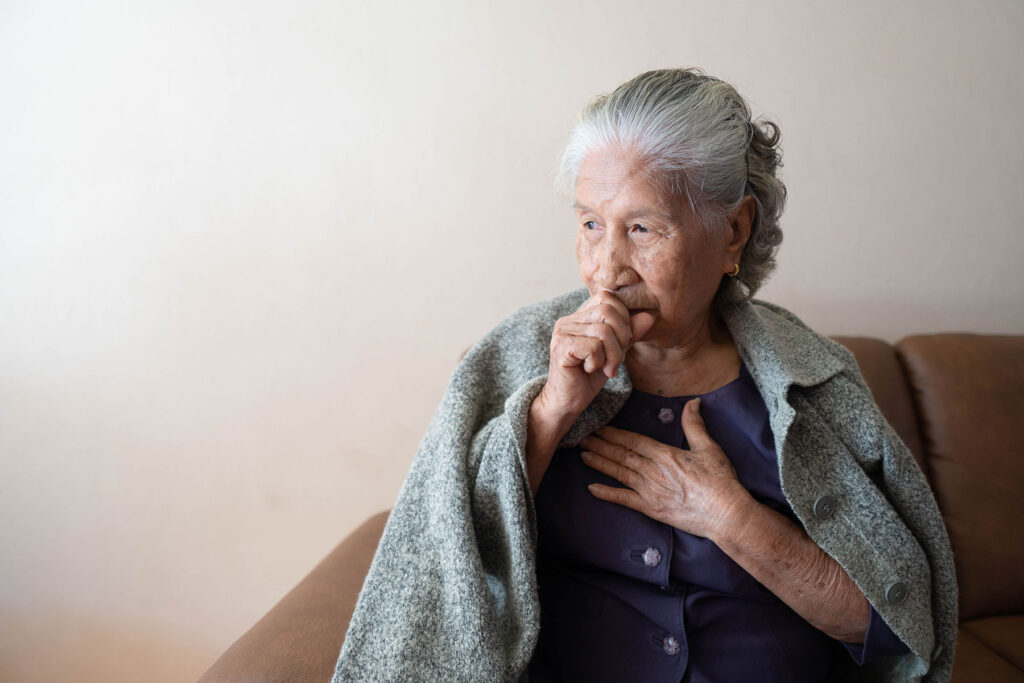Pneumonia in seniors is a serious condition that requires treatment right away. Pneumonia can quickly get worse and become dangerous if left untreated. At Buckner Retirement Services, we understand the importance of recognizing the signs and symptoms of pneumonia in seniors. We have services that help our residents maintain their health and well-being, including on-site healthcare professionals who can provide prompt treatment for pneumonia.
Any senior who is exhibiting symptoms of pneumonia should seek skilled nursing care or hospital care right away. At Buckner Retirement Services, we know the signs of pneumonia in seniors and the best course of action to take when symptoms begin. Call us today at 214.227.7182 to learn more about our services.
What Is Pneumonia?
Pneumonia is a lung infection caused by bacteria, viruses, or fungi. It can be mild or severe and affects the air sacs in your lungs. Often, people develop pneumonia after having the flu or a cold. In seniors, pneumonia can be more serious because they may have weakened immune systems and other underlying health conditions that cause complications.
5 Signs of Pneumonia in Seniors
Here are five signs of pneumonia in seniors:
1. Chest Pain
One of the most common signs of pneumonia in seniors is chest pain, particularly when coughing or breathing. No matter what the cause, chest pain is a cause for concern among seniors. Even minor chest pain can be an early signal, and catching pneumonia as soon as possible can make a big difference in recovery.
2. Fatigue
Seniors who get enough rest and nutrients should not be experiencing fatigue during waking hours. If a senior is experiencing fatigue, it is often linked to an underlying medical condition and could be pneumonia. Pneumonia is a severe condition that takes a lot of energy for the body to fight off. A senior’s immune system will kick into overdrive to help fight off the disease, leaving them with little energy during the day. Letting the body rest so it can use energy to fight pneumonia and receive treatment is the best course of action.
3. Fever, Sweating, and Chills
Fever, sweating, and chills often come as one of the later stages of pneumonia in seniors. At this point, the senior has likely been battling the sickness for at least a few days and may experience these symptoms in addition to body aches. Fever, sweating, and chills can be mistaken for bad cold symptoms or the flu. However, if you notice these symptoms in older adults, they must seek medical attention. Failing to address pneumonia at this stage can lead to a dangerous situation and a difficult recovery.
4. Low Body Temperature
Low body temperature is another one of the common symptoms of pneumonia in seniors. This is usually a symptom unique to adults over the age of 65 and for people with compromised immune systems. In combination with other symptoms, low body temperature indicates that the senior has or is developing pneumonia. Sometimes a low body temperature read can be written off as an inadequate reading or an off-day. However, an abnormal body temperature for seniors can be very serious and should be addressed by a medical professional immediately.
5. Severe Cough
It is not uncommon for seniors to develop a mild cough, especially during cold and flu season. However, a severe cough, especially with phlegm, is often experienced in both the early and late stages of pneumonia in seniors. Unless it is caught very early, seniors rarely experience pneumonia without developing a cough, so this is a clear sign to seek medical treatment. With pneumonia, coughing will likely get worse as the days progress.
A severe cough can cause other medical issues for seniors, including:
- Headache
- Ruptured blood vessels
- Vomiting
- Dizziness
- Fractured ribs
- Loss of bladder control
- Excessive sweating
The earlier pneumonia is treated, the earlier the severe cough can subside.
Treatment for Pneumonia in Seniors
Treatment for pneumonia in seniors is the same as it is for people of any age. Treatment typically involves antibiotics, rest, and fluids. In severe cases, a senior may need to stay in the hospital so they can get more intensive care.
However, seniors who get pneumonia may not be able to take care of themselves. This is why at Buckner Retirement Services, we have skilled nursing and medical care teams to help our residents with any illnesses. We provide 24/7 support for all of our residents so that we can address any health issues right away.
Managing Senior Health at Buckner Retirement Services
We know how serious pneumonia in seniors can be at Buckner Retirement Services. Our staff knows to look for the signs, even in the early stages, and will get the proper medical care immediately. We also work closely with doctors to ensure seniors receive the best treatment for their symptoms. This may include antibiotics and other medication for fever and pain management. Additionally, our trained staff will assist with breathing treatments, as well as monitoring oxygen levels, and helping with any necessary activities of daily living that may be difficult during pneumonia recovery.
To learn more about the professional staff and senior living at Buckner Retirement Services, contact us today at 214.227.7182.

